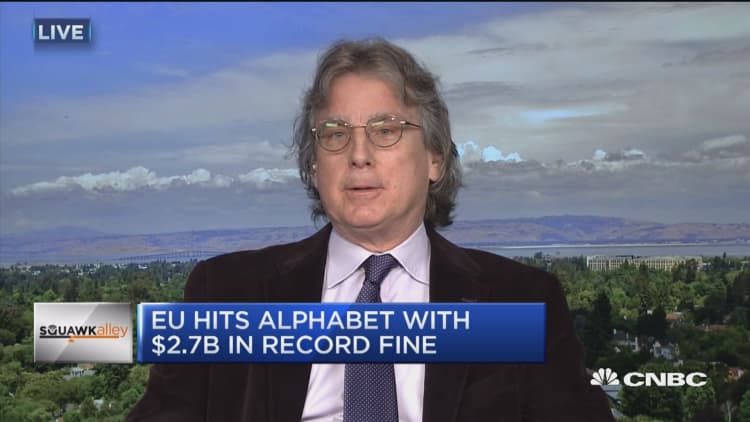
Google shareholders won't be phased by the EU's $2.7 billion fine against the company for competition abuses related to its shopping business, Elevation Partners co-founder Roger McNamee told CNBC on Tuesday.
"As a shareholder of Google you're looking at this and saying: 'We won again,'" McNamee said.
The venture capitalist spoke hours after EU regulators fined Google a record 2.4 billion euros ($2.7 billion), ruling that the search-engine giant violated antitrust rules for its online shopping practices.
Google said it will consider appealing the decision to the highest court in Europe.
"Google, , are increasingly just super-monopolies, especially Google and Facebook. The share of the markets they operate in is literally on the same scale that Standard Oil had ... more than 100 years ago — with the big differences that their reach is now global, not just within a single country," he said on "Squawk Alley."
The fine is not large enough to change Google's behavior, he added. "The only thing that will change it is regulations that actually say you can or can't do something."
McNamee said Google's business model isn't structured in a way that allows for competition. "The way that Google's product works makes its anti-competitive behavior much more obvious — but do not underestimate how powerful Facebook's monopoly has been to boosting Instagram and WhatsApp," he said.
The competition issue with the big tech companies extends beyond the EU into the U.S., he said. "They do stifle innovation. They stifle entrepreneurship. ... You can see this even in Silicon Valley it's very hard for any of the unicorn generation of companies to actually reach successful critical mass because, you know, one of their competitors gets acquired by Google and Facebook and then the category is over," said McNamee.
"I think it's a big policy question the world is going to have to deal with over the next few years," he said.
Google, Facebook and Amazon did not immediately respond to CNBC's request for comment.
WATCH:
Google gave 'illegal advantage' to its own shopping site, says European Commissioner Vestager



